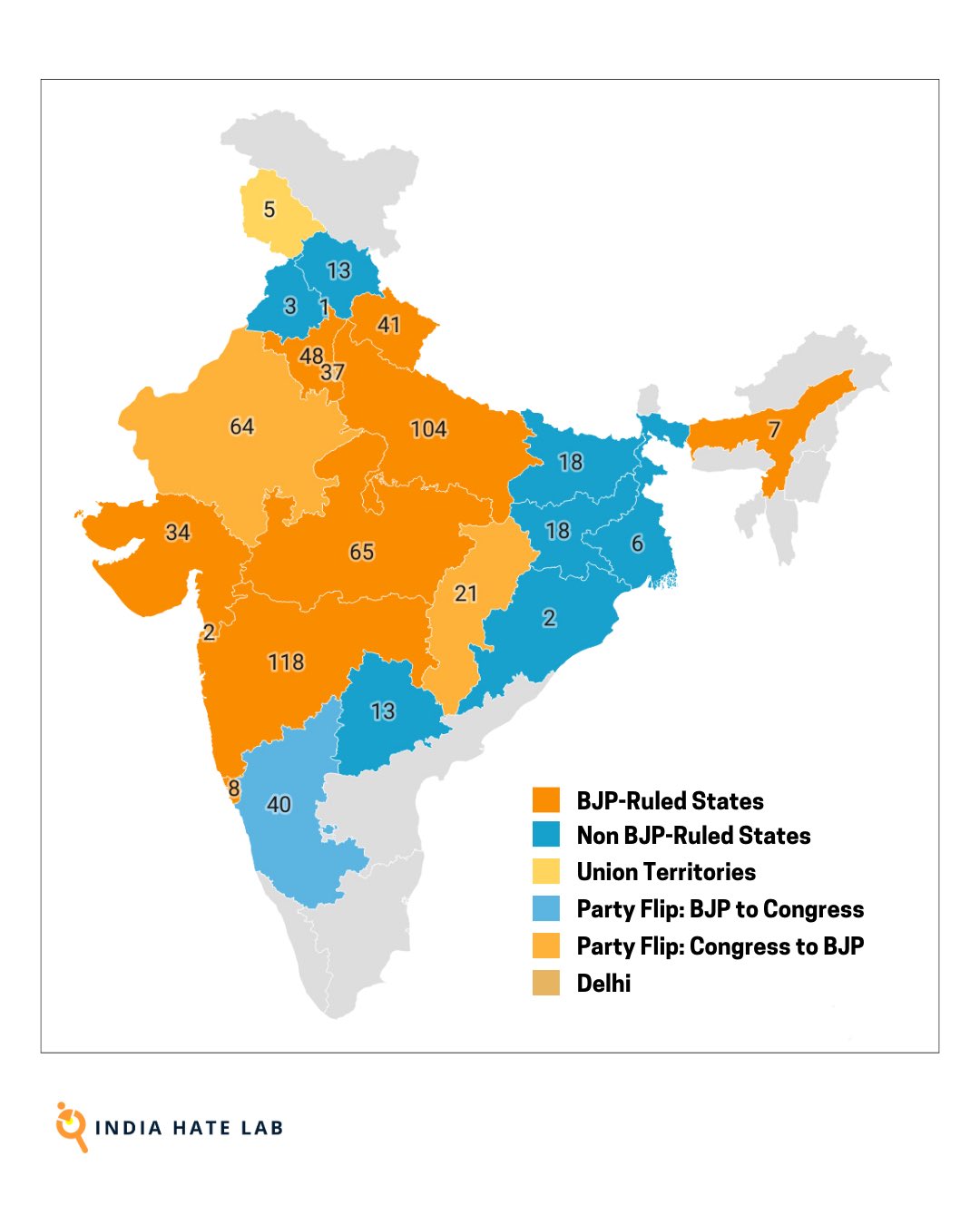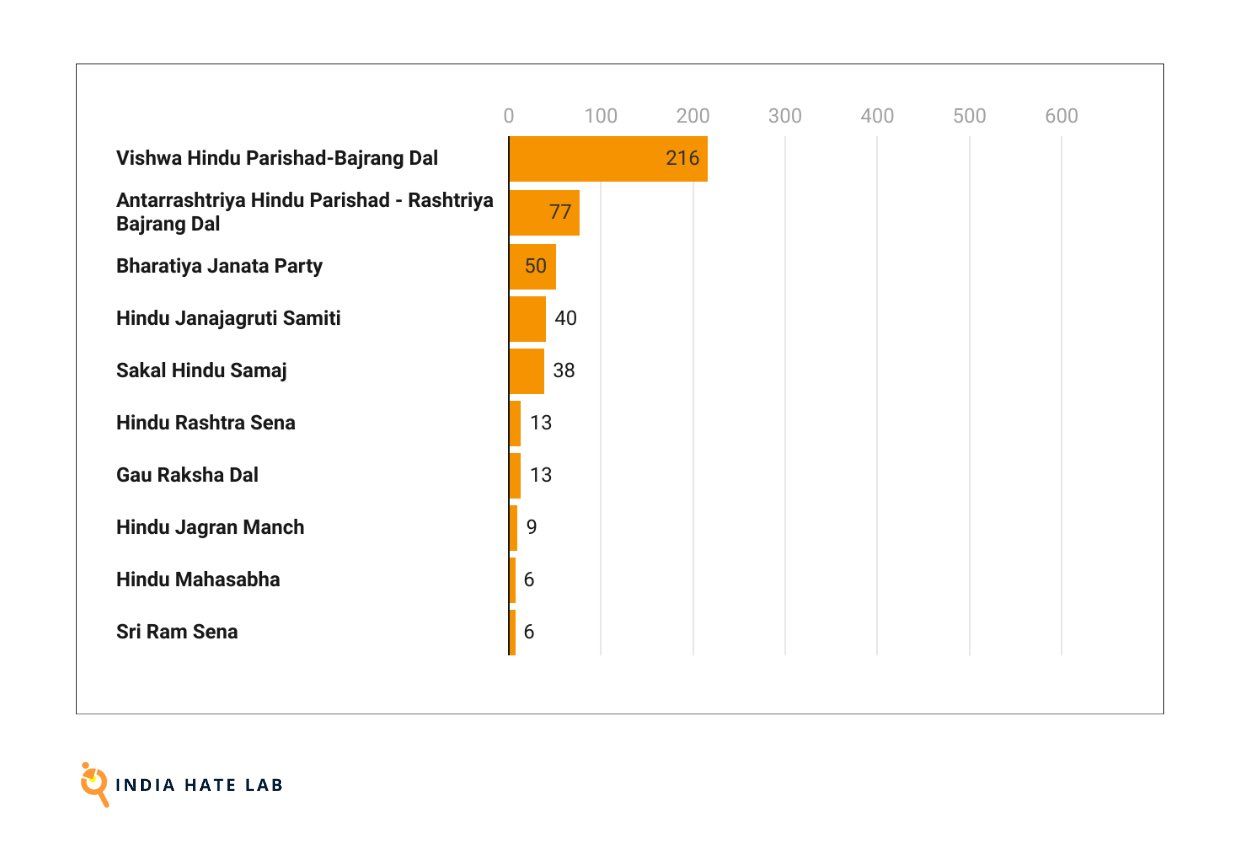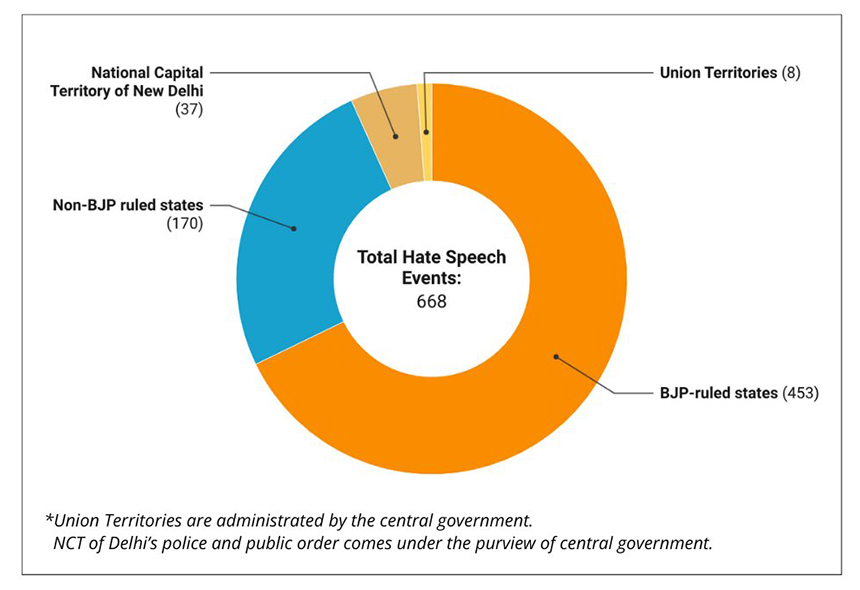A report by India Hate Lab which has documented 668 anti-Muslim hate speech events in 2013 is a reflection of how during the recent years, anti-Muslim hate speech has been normalised and become part of India’s socio-political sphere, and how it is being employed during the elections to polarise voters.
Groundxero | 26 February, 2024
Anti-Muslim hate speech in India disturbingly rose by 62% in the second half of 2023, compared to the first six months of the year, according to a report by India Hate Lab, a Washington DC-based group that documents study, and analyze hate speech, disinformation, and conspiracy theories targeting India’s religious minorities. India averaged nearly two anti-Muslim hate speech events per day in 2023 and 75 percent of those events took place in BJP ruled states, revealed the report.
The 47-page report titled ‘Hate Speech Events in India’ has documented 668 anti-Muslim hate speech events held across 18 states, 3 union territories and NCT of Delhi in 2023. While 255 hate speech events took place in the first half of 2023, “the number rose to 413 in the second half of the year, a 62% increase”, the research group said in a report released on Monday. There was no comparative data for prior years.
India Hate Lab has documented the widespread occurrence of hate speeches directed at Indian Muslims across various platforms, including social media, political rallies, and mainstream media outlets. These hate speeches often propagate divisive narratives, demonise Muslims, and promote discriminatory attitudes, contributing to an atmosphere of fear, mistrust, and hostility towards the Muslims. The report has used the United Nations’ definition of hate speech as “any form of communication… that employs prejudiced or discriminatory language towards an individual or group based on attributes such as religion, ethnicity, nationality, race, colour, descent, gender, or other identity factors.”
According to the report, while 36% (239) of the hate speech incidents “included a direct call of violence against Muslims”, 63% (420) included references to Islamophobic “conspiracy theories, primarily involving love jihad, land jihad, halal jihad and population jihad”. About 25% (169) featured speeches calling for targeting Muslim places of worship.
Also a staggering 75% of the anti-Muslim hate speech events (498) took place in BJP-ruled States, Union Territories (administered by the BJP-led Union government), and Delhi (police and public order comes under the Union Home Ministry’s purview). Maharashtra with 118, Uttar Pradesh with 104, and Madhya Pradesh with 65 hate speech events are the top ranked states. All these three states are currently ruled by the BJP, and collectively account for 43 percent of the total hate speech events recorded in 2023.
Other BJP-ruled states like Haryana witnessed 48 hate speech events or about 7.2 percent, and Uttarakhand made up 6 percent. Both these states are among the emerging hotbeds for anti-Muslim violence as well. Seven people died and over 70 were injured in violence in the Nuh region of Haryana in August 2023; while at least five Muslims were killed in Haldwani in Uttarakhand in February 2024, while protesting against the demolition of a mosque and a madrasa.
 The report revealed that one third of all hate speech events were organised by two far-right organisations, the Vishwa Hindu Parishad (VHP) and the Bajrang Dal, and Hindu far-right influencer Kajal Hindustani, chief of Antarrashtriya Hindu Parishad (AHP) Pravin Togadia, chief of Hindu Rashtra Sena, Dhananjay Desai and BJP legislator T Raja Singh are the top three sources of hate speech.
The report revealed that one third of all hate speech events were organised by two far-right organisations, the Vishwa Hindu Parishad (VHP) and the Bajrang Dal, and Hindu far-right influencer Kajal Hindustani, chief of Antarrashtriya Hindu Parishad (AHP) Pravin Togadia, chief of Hindu Rashtra Sena, Dhananjay Desai and BJP legislator T Raja Singh are the top three sources of hate speech.
Another interesting finding of the report is that 70% of the hate speech events documented in the report took place in states with upcoming elections. The hate speech events peaked between August and November, coinciding with the period of political campaigning and polling in four major states. This suggests a concerning correlation between political rhetoric and the proliferation of hate speech targeting Muslims, highlighting the deliberate escalation of communal tensions and polarisation for electoral gains.
Another significant revelation is the surge in anti-Muslim hate speech since the Israel attack on Gaza on 7 October. Out of 193 anti-Muslim hate speech events that took place between October 7 (the day Hamas attacked Israel and the beginning of Israel’s war on Gaza) and December 31, 2023, 41 (21%) mentioned the Israel-Gaza war to stoke hatred towards Indian Muslims.
It needs to be noted that last month, the website of India Hate Lab was blocked by the Ministry of Electronics and Information Technology under the controversial Information Technology (IT) Act, 2000. The government has blocked the website of Hindutva Watch, an independent hate-crime tracker also run by the India Hate Lab’s founder.
The surge in hate speech is more concerning, given that it is happening even after the Supreme Court of India’s order to all state governments to lodge criminal cases and investigate hate speeches irrespective of the person’s religion without waiting for formal complaints from a citizen. The reality is that despite or in spite of the highest court’s direction to the executive, anti-Muslim hate speech has in fact been normalised and become part of India’s socio-political sphere in recent years. It will be used rampantly by the ruling BJP party in the upcoming general elections to polarise voters, particularly in states where the [ruling] BJP’s electoral support is relatively fragile.


